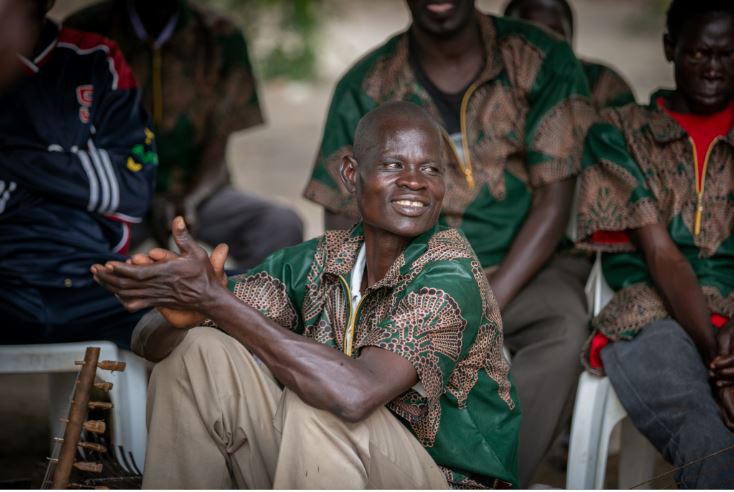First clean-burning briquettes delivered to refugee families!
Our project sent briquettes to 30 families this month. It turns out these clean-burning briquettes prevent more CO2 emissions than we expected.

Just the gist
If you're in a hurry, here's what you need to know this month:
- The project has sent its first briquettes to 30 families! The project has sent briquettes to 20 families in the Adjumani refugee settlement, and 10 families in the adjacent refugee host community.
- The project is preparing to scale up. It has 10 tons of briquettes ready to send to refugees, and over 150 tons of biochar ready to compress into briquettes.
- The briquettes will prevent more CO2 emissions than expected! They will prevent 7.33 tons of CO2 per ton of briquettes, up from the original estimate of 5.46 tons of CO2.
For more updates like this one, follow Wren on Twitter and Instagram.
2021 has gotten off to a bright start for our Clean Cooking Fuel for Refugees project. Despite the struggles of operating in a pandemic, they've produced and delivered their first briquettes to families!
In the middle of December, the project sent briquettes to 20 families in the Adjumani refugee settlement in Uganda. Another 10 refugee families in the adjacent host community were supplied with clean-burning briquettes a few days later.
This project was hit especially hard by COVID-19. Wren contributions, like yours, were crucial in keeping the project running. Your subscription kickstarted briquette production, and will continue to help the project scale up. Thank you!

Focus is on briquette production, as election fever heats up in Uganda
The project is preparing to scale up – but the Ugandan elections have thrown a spanner in the works. It's unsafe for our project partners to make deliveries to homes around Uganda in such a heated political environment. For now, they're focusing on production, and will wait until next month to deliver the next batches of briquettes.
10 more tons of briquettes have already been made, waiting to be delivered. And 150 tons of biochar are sitting in our project's warehouses, ready to be compressed into briquettes. While Ugandans flock to the polls, our project will continue producing briquettes, which will be ready to deliver in February.

Clean burning briquettes save even more CO2 than expected
The rural authority has confirmed they will connect our project with hydroelectricity, but it hasn't been set up yet. This hasn't stopped our project though, who are producing briquettes using a Diesel generator for now.
Despite using Diesel power, these briquettes account for more than enough CO2 to be considered carbon offsets. We'll break down how this works, but first, here's the TLDR.
TLDR: 0.086 tons of CO2 are emitted when making 1 ton of briquettes using Diesel energy. But burning these briquettes prevents the use of 1 ton of firewood. And burning the additional biochar produced as a side product prevents the use of a further 1 ton of firewood. Burning 1 ton of firewood releases 3.71 tons of CO2. So for every 1 ton of briquettes, (2 x 3.71) - 0.086 = 7.33 tons of CO2 saved.
“Even when subtracting the CO2 emissions from the syngas used in the gasifier stoves, and the 0.086tons of CO2 emitted per ton of husk briquettes produced, accounting for the transport of the briquettes to market via electric vehicles run on renewable energy, the net reduction in CO2 emissions is still significantly higher than the estimate we set at the beginning of the project (5.46 tons of CO2 per ton of briquettes used).”
Peter Nyeko, Project Lead

Here's the detailed breakdown:
- It takes about 32 litres of Diesel to generate 160kWh of electricity, enough to make 1 ton of briquettes. 0.086 tons of CO2 are emitted as a byproduct.
- 1 ton of briquettes made of rice husks and nut shells replaces roughly 1 ton of firewood, which remains sequestered in a tree.
- Additionally, each ton of these briquettes means the rice husks and nut shells will not be burnt as a means of waste disposal.
- The 1 ton of husk briquettes are used as fuel in gasifier cook stoves by refugees. Each ton of briquettes used up produces about 0.25 tons of biochar as a byproduct.
- Biochar is very energy dense. 0.25 tons of biochar can produce enough energy to replace another ton of firewood, which remains stored in a tree.
- So two tons of firewood are saved from burning per ton of briquettes produced. Each ton of firewood burned releases 3.71 tons of CO2. A total of 7.42 tons of CO2 is prevented from being emitted by using 1 ton of briquettes.
- 7.42 tons of CO2 prevented from emission - 0.086 tons of CO2 emitted in production = 7.33 tons of CO2 saved.
That's it for this update! If you have questions or feedback, please reply directly to this email. I'll reply as soon as I can.
– Thomas Hollands

